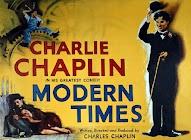I haven't seen all of Charlie Chaplin's films, but this is the best of the films that I know. It's a politically motivated film, even though it's difficult to say exactly what he's protesting about. So much happens in 90 minutes that it's difficult to join the dots.
Charlie Chaplin plays an unnamed man living in New York at the time of the great depression. He works tightening screws on a conveyor belt which is constantly being speeded up. All his efforts bring nothing. The factory closes down and he becomes homeless. We see him going in and out of jail, being arrested for things he didn't do. If anything, he's happy to be in jail, because he has nowhere to go to when he's released.
As the depression eases up he finds work, but he's so awkward that he can never keep a job for long. He has more success in romance. He meets an orphan girl, Paulette Goddard, who is also homeless and makes money by dancing and stealing. She finds a hut for them to live in, probably abandoned company property.
Even though the film was made in 1936, well into the sound era, this isn't a pure talkie. Despite having sections with sound, such as Charlie himself singing, there are silent passages where text cards are used. It's a hybrid film, halfway between silent movies and talkies. Hollywood was fast to abandon silent films when sound became possible, but Charlie Chaplin still clung to the old ways.
It's a love story. It's a tale of survival in the modern industrial age. It's a tale of political upheaval and police brutality. More than anything else, it's a comedy. It's best not to try to understand it. Just sit and watch it and laugh.
 |
Order from Amazon.com |
| Order from Amazon.co.uk | |
| Order from Amazon.de |


.jpg)
No comments:
Post a Comment
Tick the box "Notify me" to receive notification of replies.